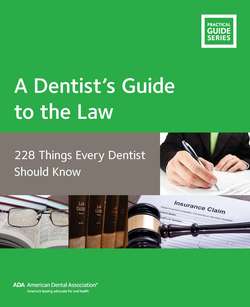Читать книгу A Dentist’s Guide to the Law - American Dental Association - Страница 22
На сайте Литреса книга снята с продажи.
ОглавлениеChapter 2.
Know the Law
Dental practices must comply with a wide array of laws, such as laws that apply to health care providers, employers, and business entities. Understanding these law can help you protect your patients and your practice on a day-to-day basis, and can help you decide when you need help from a lawyer or from another professional, such as an accountant.
4. What Are Some Laws That Apply to Dentistry?
Here are some examples of laws that might apply to a dental practice:
• Dental Practice Acts
• Professional corporation laws
• Tax laws
• Laws that apply to landlords, tenants, and owners of real estate
• Employment laws, such as the Occupational Safety and Health Act (OSHA) and nondiscrimination laws
• Laws on prescribing drugs, such as state prescribing laws and the federal Controlled Substances Act
• Dental records laws
• Patient privacy laws, such as the Health Insurance Portability and Accountability Act of 1996 (HIPAA)
• Laws on insurance, professional liability, and lawsuits
Some laws are federal and others are state or local. Dental practices must understand the requirements of laws on all three levels. For example, the Americans with Disabilities Act (AwDA) is a federal law, but state and local governments may also have disabilities laws, and a dental practice may need to comply with laws on all three levels.
Some laws apply to everyone, and some apply only to certain individuals and entities. Laws such as a state dental practice act are specific to dentistry. Laws such as HIPAA apply to many, but not all, dental practices. Each dental practice should determine which federal, state and local laws apply, and what the dental practice must do to comply. It is important to consider all of the laws that may apply in a given situation.
In this book we often use the word “law” to apply to a number of things, such as:
• Statutes enacted by legislators
• Rules and regulations from government agencies
• Case law from courts
A dental practice must comply with all applicable laws, no matter what the source.
5. What Key Federal Laws Apply in Dentistry?
A number of federal laws may come into play in the dental office, such as antitrust, collections, disability rights, employment, environmental, marketing, malpractice settlement reporting, office safety, patient privacy, taxation, and more. Some are addressed more thoroughly throughout this book.
Federal laws may preempt or override similar state laws. Some federal laws preempt state law but allows more stringent state law requirements to remain in force, as with the AwDA and HIPAA. In such cases, dentists must satisfy both the federal and certain state requirements.
Related References and Resources
• Some Laws That Can Affect Dentistry
ADA.org/DentistGuidetoLaw
6. What Key State Laws Do I Have to Comply With?
If you are a dentist, your state dental practice act is a key state law with which you must comply. Among other things, the practice act will establish your authority to practice, along with your legal scope of practice. The practice act may address whether and how you may delegate duties to allied dental personnel. It may also specify certain requirements on issues ranging from confidentiality and privacy to insurance requirements and more.
Practice acts are by no means uniform from state to state. For example, recordkeeping requirements may vary. Rules governing allied personnel are sometimes included in the dental practice act, although a state may have a separate act or acts for this purpose (such as a practice act for hygienists). These rules can vary by state as well. For example, certification requirements for dental assistants to do coronal polishing can vary from state to state.
In addition to your state practice act, other state laws will also come into play. State law may be targeted to other (or perhaps all) health care workers in the state (for example, patient privacy rights, or heightened privacy rights for persons infected with HIV). State laws of general applicability statewide must also be followed, such as employment laws that cover all employers in the state. State law may impose requirements not addressed under federal law, or may go beyond the requirements under federal law. Compliance with state law can depend on whether there has been federal preemption, as discussed above.
